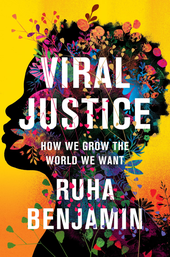
Viral Justice
Long before the pandemic, Ruha Benjamin was doing groundbreaking research on race, technology, and justice, focusing on big, structural changes. But the twin plagues of COVID-19 and anti-Black police violence inspired her to rethink the importance of small, individual actions. Part memoir, part manifesto, her new book Viral Justice is a sweeping and deeply personal exploration of how we can transform society through the choices we make every day.
In Viral Justice, vividly recounting her personal experiences and those of her family, Benjamin shows how seemingly minor decisions and habits could spread virally and have exponentially positive effects. She offers a passionate, inspiring, and practical vision of how small changes can add up to large ones, transforming our relationships and communities and helping us build a more just and joyful world. Tonight she will discuss the ideas, concepts, and hopes of her book with Sennay Ghebreab.
COVID-19 information
If you are feeling unwell, please stay at home.
Please wear a mask if you feel more comfortable.
There will be masks available at the venue.
About the speakers
Ruha Benjamin is an internationally recognized writer, speaker, and professor of African American Studies at Princeton University, where she is the founding director of the Ida B. Wells Just Data Lab. She is the award-winning author of Race After Technology: Abolitionist Tools for the New Jim Code and editor of Captivating Technology, among many other publications. Her work has been featured widely in the media, including The New York Times, The Washington Post, CNN, The Root, and The Guardian.
Sennay Ghebreab is Associate Professor of Socially-Intelligent AI at the University of Amsterdam, program director Master Information Studies, and Scientific Director of Civic-AI Lab.
Tobias Blanke (moderator) is Professor of Humanities and AI and the University of Amsterdam.

:rgb(-15)

:rgb(-25)

:rgb(8)
